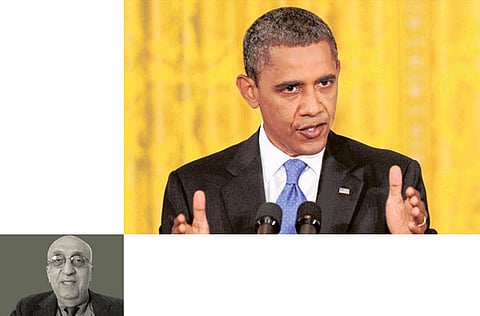US sending the wrong signals
Washington is targeting Iran instead of addressing Syrian crisis

Although Syria seems on the verge of imploding, US President Barack Obama and his Republican rival Mitt Romney — both locked in a tight presidential campaign — are still distracted, focusing elsewhere in the Middle East — yes, on Israel and its inflated ambitions!
The threat of civil war looms large within Syria. But what is lately serving as an unexpected protective wall for the Alawite Syrian leader Bashar Al Assad is the overwhelming rise of powerful Islamist groups in the region. It happened in Egypt last month, and in Tunisia. Libya is expected to follow suit in the weeks ahead.
On the other hand, many Arab secularists and other larger religious sects are seemingly dismayed by this turnaround, a situation that continues to paralyse western powers, former supporters of various autocratic regimes in the Arab world. Needless to say, the position of Russia, a firm supporter of Syria, cannot be overlooked.
This was highlighted after the failure of the Geneva meeting of the so-called Action Group, which includes the five permanent members of the UN Security Council and four Middle Easte states, to reach an agreement on a unity government in Syria. Surprisingly, the meeting did not indicate anything about the future of the Syrian president. In other words, Al Assad’s future remains secure until Kofi Annan, the special envoy to Syria, can come up with something more appealing.
But while the toll in the Syrian uprising has been increasing daily, the Obama administration has “quietly moved significant military reinforcements” into the Arabian Gulf “to deter the Iranian military from any possible attempt to shut the Strait of Hormuz.” The New York Times added last Tuesday in an exclusive lead news story that the US has also increased the number of fighter jets “capable of striking deep into Iran if the stand-off over its nuclear programme escalates”.
The paper explained that bolstering the American presence there was “to reassure Israel that in dealing with Iran,” and as one unidentified senior administration official put it last week, “when the president says there are other options on the table beyond negotiations, he means it”.
Meanwhile, the paper reported that the US administration is also seeking to expand military ties with the six members of the Gulf Cooperation Council — Saudi Arabia, Kuwait, Bahrain, Qatar, UAE and Oman. In September, the US and 19 other countries will be holding a major mine countermeasure exercise in the Gulf.
Sen John Kerry, the Democratic chairman of the Senate Foreign Relations Committee, told the paper that the administration must strike a fine balance between positioning enough forces to deter Iran, but not inadvertently indicate to Iran or Israel that an attack on Iran’s nuclear sites is imminent or inevitable. “People need to know, want to know you are serious, but you must also leave room for peaceful resolution. It is very important not to take steps that send the wrong messages here.”
Romney, with his strong defence of Israel, according to a Washington Post report, “has sought to consolidate his support among pro-Israel evangelical Christians as well as Jewish voters and donors. Jews overwhelmingly supported Obama in the 2008 campaign, but Romney’s strategists think some could be swayed to switch allegiances this time, especially in the state of Florida”.
This report has raised eyebrows because it followed an announcement that Romney is planning a trip to Israel this summer before he formally accepts the Republican presidential nomination. Romney has visited Israel several times, most recently in January 2011.
George S. Hishmeh is a Washington-based columnist. He can be contacted at ghishmeh@gulfnews.com
Sign up for the Daily Briefing
Get the latest news and updates straight to your inbox



